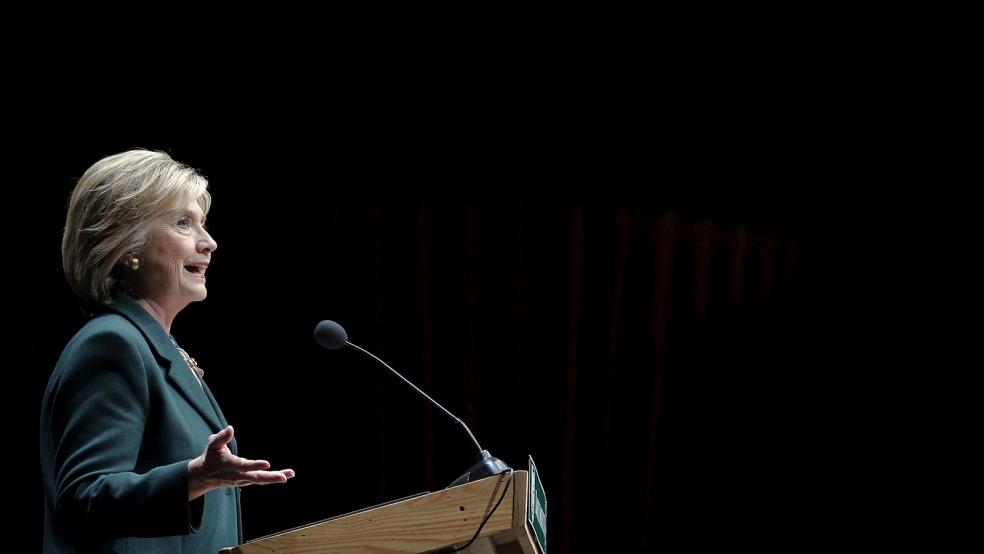Former Secretary of State Hillary Clinton has said repeatedly she will not establish a “third term” of the Obama administration if she is elected president, and the Democratic frontrunner has done her best to put some daylight between herself and President Obama.
Most notably, she has opposed the 12-nation Trans-Pacific Partnership trade deal that is the capstone of Obama’s trade policies. She also called the Obama administration’s record 438,421 deportations of illegal immigrants in 2013 “a mistake.” She has criticized Obama’s policies in Syria too little and too late. And she favors rolling back the “Cadillac tax” on premium insurance plans under Obamacare, despite strong opposition from the administration.
Related: Hillary Clinton May Be the Biggest Winner from the Blowout October Jobs Report
Yet Clinton has to be careful to not stray too far from the Obama reservation as she competes with Vermont Sen. Bernie Sanders for the 2016 Democratic presidential nomination largely because Obama’s policies remain remarkably popular with wide swaths of the Democratic electorate.
On the eve of the second nationally televised Democratic presidential debate in Des Moines on Saturday night, a newly released New York Times/CBS News national survey shows that 60 percent of Democrats likely to take part in the primaries want their party’s nominee to continue Obama’s policies. And those voters support Clinton over Sanders by roughly a 2 to 1 margin.
Obama’s popularity with the public has generally been on an upswing in recent months, according to Gallup polling, and currently stands at 49 percent or 2 points above his term average and 9 points higher than his lowest point in November 2014. But while roughly nine in ten Democrats approve of the president’s performance, little more than one in ten Republicans feel the same way. And in many marginally blue or red states, Obama’s policies on the environment, immigration and health care are hugely unpopular.
This helps to explain why it is so risky for Democrats like Clinton to be too closely associated with Obama’s domestic and foreign policies. While it may have some salient political benefits in winning primary elections, many Democratic candidates have found Obama’s coattails the kiss of death in general elections for congressional, gubernatorial and state legislative races.
Related: How the TPP Trade Deal Could Blow Up the Primaries
Since sweeping to victory in 2008 on a Democratic crest, Obama has presided over “a shrinking party whose control of elected offices at the state and local levels has declined precipitously,” The New York Times reported today. Republicans will occupy 32 of 50 governorships in January, or 10 more than when Obama first took office. And Democratic losses in state legislatures under Obama’s watch “rank among the worst in the last 115 years,” The Times said.
Last November, Republicans recaptured control of the Senate by piling up victories in nine states where Democrats had held seats – including Alaska, Arkansas, Colorado, Iowa, Louisiana, West Virginia, and North Carolina. In many of those races, Democratic incumbents sought to distance themselves from Obamacare or even criticize some of his Obama’s policies – but all for naught.
So neither Clinton nor Sanders can afford to get too close to Obama’s policies and legacy.
Despite a strategic decision to step up his criticism of Clinton in recent weeks – including voicing support for an FBI investigation of Clinton’s use of personal emails while at State and accusing her of being out of step with progressives’ demands – Sanders has failed to make up much ground against Clinton in the run-up to next year’s crucial primary contests in Iowa and New Hampshire.
Related: Bernie Sanders Does an About-Face on Clinton’s Emails
According to The New York Times/CBS survey, Clinton is drawing 52 percent of the Democratic primary vote compared to 33 percent for Sanders. She has slipped only slightly from her showing in the poll in early October, when she led Sanders 56 percent to 32 percent. But the poll suggests that Sanders is losing his momentum after a remarkable start in which he drew large, youthful crowds and nearly matched Clinton in fund raising in the last quarter.
The self-described Democratic socialist has offered himself as a change agent for his party while attempting to draw sharp contrasts between himself and Clinton on trade policies, expanding Social Security benefits, legalizing marijuana and other issues, a full 62 percent of Democratic primary voters said that Clinton “could bring about real change in the way things are done in Washington,” compared with 51 percent who said the same thing about Sanders, according to the poll.
On just about every major concern, from international crises and gun laws to managing the economy and regulating banks, Democratic primary voters said that Clinton would be better able to handle them. Sanders only topped Clinton in one category, 30 percent to 25 percent, and that was in helping to reduce the financial gap between rich and poor Americans – Sanders’ signature campaign theme.





